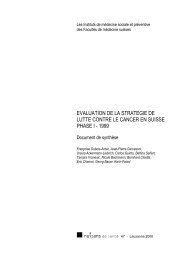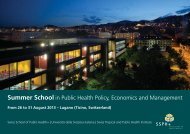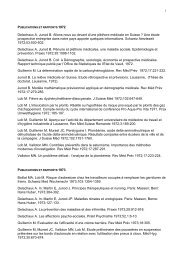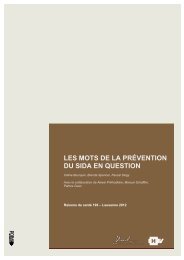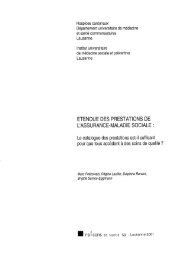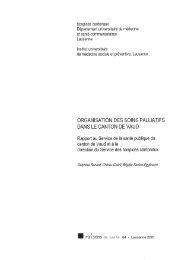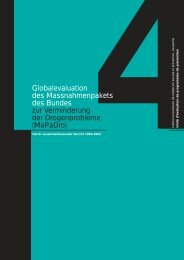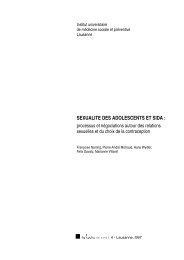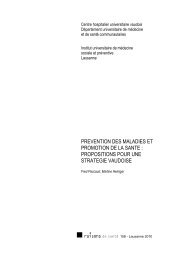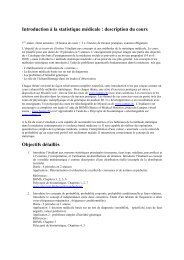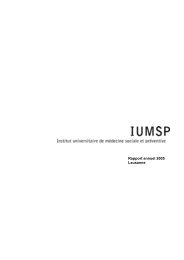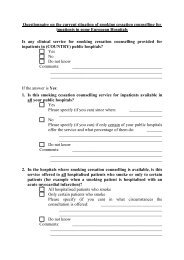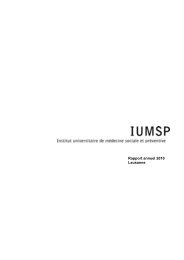Fortbildungen / Formations continues 2012 - IUMSP
Fortbildungen / Formations continues 2012 - IUMSP
Fortbildungen / Formations continues 2012 - IUMSP
Erfolgreiche ePaper selbst erstellen
Machen Sie aus Ihren PDF Publikationen ein blätterbares Flipbook mit unserer einzigartigen Google optimierten e-Paper Software.
provision of information, psychosocial support, practical<br />
assistance and sexual issues 15 . However, lung cancer seems<br />
an underexplored population. A search in CINAHL and<br />
PUBMED resulted in three studies assessing the supportive<br />
care needs of this speci�c population 16-18 . Many assessments<br />
of supportive care needs focused on cancer patients<br />
in general at different stages of the disease or speci�cally<br />
on breast cancers patients 15,19 . The few studies focussing<br />
on the needs of lung cancer patients suggest that lung<br />
cancer patients have signi�cantly more unmet supportive<br />
care needs than other patients groups 16 . Results showed<br />
also that patients living with lung cancer reported especially<br />
high unmet supportive care needs in the psychological<br />
and physical and daily living domains 16-18 . To our<br />
knowledge, no needs assessment of lung cancer patients<br />
in the Swiss health care system has been conducted. To<br />
improve high quality care including patient self-determination<br />
needs assessments are among the prioritized goals<br />
of the national cancer programme 20 .<br />
The goals of this study are (a) to describe the unmet supportive<br />
care needs among patients suffering from lung<br />
cancer during the chemotherapy phase at a University<br />
Hospital in Switzerland and (b) to explore a potential relation<br />
between the unmet supportive care needs and the patient’s<br />
age, gender and smoking cessation after diagnosis.<br />
Method<br />
Sample and Setting<br />
We conducted a descriptive study by means of a crosssectional<br />
survey in a Swiss University Hospital. Patients<br />
were recruited in the outpatients’ and inpatients oncological<br />
departments following a non-probability consecutive<br />
Tab. 2. 11 needs that were not met by at least 50% of the patients (n= 37)<br />
LUNGENKREBS<br />
sampling method. Adult lung cancer patients that were<br />
undergoing chemotherapy treatment between January<br />
2011 until February <strong>2012</strong> with 5 months break (April-<br />
August 2011) were invited to participate in the study.<br />
Patient eligibility criteria included being registered in<br />
the hospital as lung cancer patients (NSCLC or SCLC), at<br />
least eighteen years of age, being diagnosed 16 weeks ago,<br />
being under chemotherapy treatment, being capable of<br />
speaking and writing in French and being physically and<br />
mentally able to complete the questionnaire. This study<br />
was approved by cantonal ethics committee (174/10).<br />
Procedure<br />
The oncologist of each patient met patients during post chemotherapy<br />
consultation and explained study objectives and<br />
methods, handed out two questionnaires with a stamped<br />
return envelope to patients. An accompanying cover letter<br />
was used to remind patients of the main study goal. Participants<br />
who did not return the questionnaires after 3 weeks<br />
received a follow-up telephone call by the investigator.<br />
Measures<br />
We used the Support Care Needs Survey, short form comprising<br />
34 items (Supportive Care Needs Survey-SF34) 14 .<br />
The purpose of the SCNS SF 34 instrument is to provide<br />
a direct and comprehensive assessment of the multidimensional<br />
impact of cancer on the needs of cancer patients. The<br />
development and assessment of the survey’s psychometric<br />
properties, including a list of survey items, are fully described<br />
in the user’s guide21 . The SCNS SF 34 asks patients<br />
to indicate their level of supportive care needs with issues<br />
grouped into 5 main domains: psychological (PS), health<br />
system and information (HIS), physical and daily living<br />
(DL), patient care and support (PC) and sexuality needs<br />
Rank Need (Item of SCNS SF 34) Domain Unmet needs*<br />
n (%)<br />
1 Uncertainty about the future PS 26 (70.3)<br />
2 Being informed about things you can do to help yourself to get well HIS 24 (64.8)<br />
3 Anxiety PS 23 (62.2)<br />
3 Worry that the results of treatment are beyond your control PS 23 (62.2)<br />
4 Not being able to do the things you used DL 22 (59.5)<br />
4 Feeling of sadness PS 22 (59.5)<br />
4 Learning to feel in control of your situation PS 22 (59.5)<br />
4 Being given information (written, diagrams, drawings) about aspects of managing your illness<br />
and side-effects at home<br />
HIS 22 (59.5)<br />
5 Fears about the cancer spreading PS 21 (56.8)<br />
5 Concerns about the worries of those close to you PS 21 (56.8)<br />
6 Having access to professional counselling (eg, psychologist, social worker, counsellor, nurse<br />
specialist) if you, family or friends need it.<br />
HIS 19 (51.4)<br />
Note. DL: Physical and daily living / PS: Psychological / HIS: Health system and information (HIS)<br />
* dichotomized each item of SCNS SF 34 on Likert scale (1- 2 = no need) and (3-4-5 = unmet needs).<br />
Schweizer Krebsbulletin � Nr. 2/<strong>2012</strong> 119



